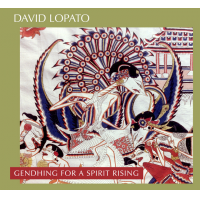Home » Jazz Articles » Album Review » David Lopato: Gendhing for a Spirit Rising
David Lopato: Gendhing for a Spirit Rising
The first disc in the set is devoted to the title composition: a symphonic-length composition for ten players in four movements written over a 15-year period. It is labelled "Java," and the Javanese musical content is reinforced by the presence of Javanese instruments on all four tracks. "Ladrang" opens the piece with a very Javanese introduction: a series of overlapping ostinato patterns, supported by Mark Perlman's Javanese kendhang (a two headed drum used in Javanese gamelan performances)—Lopato provides a virtual violin part, which take the lead in a way consistent with gamelan practice. "This Life" begins with a Whirling Dervish theme (to mix traditions for a moment), followed by jazz piano improvisation from the leader, with walking bass from Ratzo Harris and swinging trap set from Tom Rainey. Marty Ehrlich's saxophones and Mark Feldman's violin have a conversation over a Javanese ostinato pattern. After a brief introduction "Jalan Jiwa" (which translates to "Spirit Road") goes into a short gong cycle. "Gendhing," which Lopato describes as "the most purely Javanese of the lot," is the longest track. Very Javanese sounding, but Lopato used technology to support his more Western harmony: sampling made a wider range of gong pitches possible than the traditional gamelan would allow. It includes a Javanese rebab part (a bowed string instrument common to North Africa and the Middle East as well) by Lopato's teacher I.M. Harjito.
The second disc is labelled "New York." It reverses the stylistic influences of the first disc, with jazz compositions that have international influences rather than the other way around. The instrumentation is a jazz quintet (mostly consistent from track to track). "Bepoppin' With Bella" has a Balinese introduction, but goes into swing time for the body of the piece, with solos from Lucas Pino's clarinet, the leader's piano, Bill Ware's vibraphone, and Ratzo Harris' bass. "Jakshi" has a Middle Eastern rhythm (courtesy of John Hadfield's percussion), with a South Indian melody. Solos from clarinet, bass and piano—these pieces have a much more jazz approach than the ones on the first disc, with more space for improvisers. "Suite 911" was written in response to the World Trade Center attacks—Lopato and his family live less than a mile away. The approach is much more compositional than the previous tracks on this disc. "Ambush and Aftermath" has an ominous, skittering introduction, followed by a relentless ostinato, and concluding with a contemplative drum solo. "Peace March" is an actual march. Reflective and hopeful, it makes its point with a repeated theme (with variations).
Lopato is an impressive pianist as an improvising soloist. But he really makes his mark as a composer. Rarely has a project combined Asian and Western music this successfully. Gendhing For a Spirit Rising makes the combination sound completely natural.
Track Listing
Disc 1 : Gendhing For a Spirit Rising - Ladrang; This Life; Jalan Jiwa; Gendhing. Disc 2: Beboppin' With Bella; Jakshi; Suite 911 - Ambush and Aftermath; Peace March.
Personnel
David Lopato
pianoDavid Lopato : piano, keyboards, Embertone Friedlander virtual violin, marimba, vibraphone, glockenspiel, gongs, Sundanese hand drums, hand claps; Marty Ehrlich : alto and soprano sax; Mark Feldman: violin; Lucas Pino: clarinet, soprano sax; Bill Ware: vibraphone; William Moersch: vibraphone, marimba; I.M. Harjito: Javanese rebab; Erik Friedlander: cello; Ratzo Harris: string bass; Tom Rainey: trap set; Michael Sarin: trap set; Anne Stebinger; Javanese hand drums; Marc Perlman: Javanese hand drums; John Hadfield: percussion.
Album information
Title: Gendhing for a Spirit Rising | Year Released: 2017 | Record Label: Global Coolant Records
< Previous
Monochrome
Comments
Tags
For the Love of Jazz
 All About Jazz has been a pillar of jazz since 1995, championing it as an art form and, more importantly, supporting the musicians who create it. Our enduring commitment has made "AAJ" one of the most culturally important websites of its kind, read by hundreds of thousands of fans, musicians and industry figures every month.
All About Jazz has been a pillar of jazz since 1995, championing it as an art form and, more importantly, supporting the musicians who create it. Our enduring commitment has made "AAJ" one of the most culturally important websites of its kind, read by hundreds of thousands of fans, musicians and industry figures every month.




















